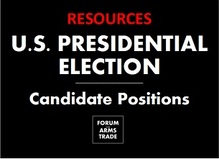
Below are some of the key findings in brief and indication of areas where more detail is needed to understand how the leading candidates might steer the United States on issues with critical impact on peace, security, human rights, and so much more.
Security Assistance to the Middle East
Both candidates are expected to support security assistance to some countries in the Middle East as well as some use of U.S. military forces there. Clinton has generally expressed a desire not to put U.S. "boots on the ground" in the region. Trump has expressed some willingness to work with Russia, but it is difficult to assess how and to whom he might provide weapons and training, or where he'd directly use U.S. military airpower or other military force.
Hillary Clinton is expected to support security assistance to the region, having said that she supports a "Plan Colombia" approach to Latin America. Donald Trump is expected to favor reduced security assistance based on his comments that security assistance is, on a general level, expensive for the United States.
Both candidates have indicated support for using armed drones, especially targeting terrorist threats. Clinton has explicitly mentioned attacking terrorist leaders, while Trump has generally been less specific regarding targets. No statements have been identified thus far on the transfer of armed drones nor promoting transparency in their use.
Although no official recent statements have been found from either candidate, Clinton is expected to support the Arms Trade Treaty while Trump is expected to oppose it.
Clinton has expressed support for the United States joining the Mine Ban Treaty. No statement have been found by Trump on the topic, but he is not expected to support the treaty
Jeff Abramson authored this post. He is a non-resident Senior Fellow at the Arms Control Association and manages the Forum on the Arms Trade.

 RSS Feed
RSS Feed